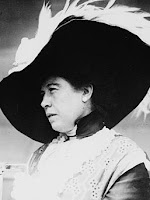For a moment let us dwell on this question: how clearly would those in Titanic’s lifeboats have heard the band’s music?
Most movies depict the band performing on the outer deck. Within that scenario it is easy to believe the music was heard in full phrases and melodies from the lifeboats. But for several reasons, which shall be discussed in future posts, it is most likely that the band performed inside at the top of the Grand Staircase throughout the sinking. With the band performing inside the ship it is unlikely people in lifeboats heard any of the music clearly.

I am no expert on acoustics, but I am aware of the fact that a room or enclosed space can act like a resonant body to pick up the vibrations of music and act to project the sounds. The cavity of the Grand Staircase could have worked like the body of a guitar or a drum to slightly magnify the band’s music.
Even the ornate dome above the Grand Staircase had an inner and outer layer, the inner concave design visible from within the ship, the outer weather-protective construction resembling the windows of a greenhouse. It is this kind of double layer that enhances sound. For this reason I do believe the survivors heard wafts of music on the air amongst other sounds, even if the outer deck doors to the Grand Staircase were closed.

This quote caught my attention. Margaret Brown said of her experience in lifeboat No. 6: “All the time while rowing we were facing the starboard side of the sinking vessel. By that time E & C decks were completely submerged, and the strains of music became fainter, as though the instruments were filling up with water….”
The first time I read this I dismissed Brown’s description because I felt it was unlikely the musicians played until water had filled their instruments. But after some thought I have come to believe Brown was attempting to describe something else here, and it may have been the acoustical properties of Titanic‘s Grand Staircase as a performance room. As the ship filled with water, the Grand Staircase along with it, the resonant area would have been steadily shrinking. Therefore, the strength of the sound emitted from the room would have become weaker, and even the sound quality would have changed as the water rose to the top. The music would literally have sounded like it was “filling with water.”
Hearing wafts of music is not the same as hearing real music. The band’s tunes heard from a distance in Titanic’s lifeboats would have been at a constant, almost imperceptible muffled volume when the deck doors were closed. Across the water listeners would have known the musicians were playing, but would have been unable to identify the music.
Then, the music would have sounded slightly louder at unpredictable and intermittent intervals when the deck doors of the Grand Staircase were opened. In these moments several beats of music would have reached out across the water with greater clarity, but again, it is unlikely from these excerpts that the survivors would have been able to identify the music. And all the while there was the general din of hurried activity on the ship.
As Titanic’s final plunge drew near, the sounds of people on the ship and in the water formed a gradual crescendo, and it was around this time when the hymn Nearer, My God, To Thee, was supposedly heard. However, I am unwilling to suggest the survivors in lifeboats did not hear music at all. I believe they heard the sounds of music in general and then something for a moment that reminded them of the hymn, and that something was the opening phrase of Songe d’automne.*



I simply don't know what to think about that subject.(Rebekah, could you check your youtube letterbox please? I've send you one question.)
LikeLike
Hi, My YouTube account isn't working at all, and I haven't been able to reply to any of my messages there. I don't know what to do about it. If you want me to send you documents I will need an email address so I can attach the – because this response is of a personal nature I'll likely delete it soon once I feel you have had a chance to read it.
LikeLike
This comment has been removed by a blog administrator.
LikeLike
(I unfortunately accidently lost all my e-mail messages in my mailbox, so if you already send me a message, please do it again)you can delete it too when you read this, and sorry for cluttering your comments place.
LikeLike
I removed your email address to protect you from getting spam. 🙂
LikeLike
Rebekah, here is my question which I send you on youtube some time: what about the Scott Joplin music in aristocratic class in Titanic times? As we know, Scott Joplin was black, so had that influence on how they, the white-praise aristocratic european man, treated him and his music? Could be Joplin's music performed on Titanic in first class?Also, were the ragtime pieces in White Star Line Music Book arranged for only piano, or for the entire piano+strings ensemble?(and sorry to be impudent but I am waiting for an e-mail from you with something I asked you for. I simply can't wait, hah!)
LikeLike
I just realized I never answered this question! Scott Joplin's music does not appear in the White Star Line songbook, neither in the version similar to the one used on Titanic, nor its successors from the 1920s or 1930s. I would guess that the main reason for his absence was because he was American, not because he was of African descent. The Black brothers were European in their musical taste, and the selections in the White Star Line request book reflect that. There are several songs in the final section which (to today's ears) smack of racism, so I won't type the titles. C. W. & F. N Black compiled the song list and procured sheet music for the musicians. I don't think it was their intention to be racist, but they simply included songs which were popular in a predominantly white society, songs that openly used words to describe people that became unacceptable through the 20th century as people became aware of universal rights.
LikeLike